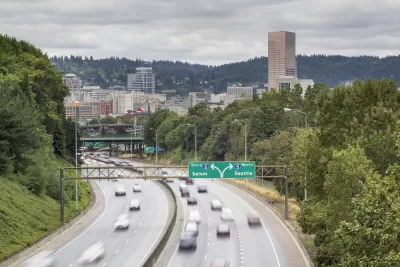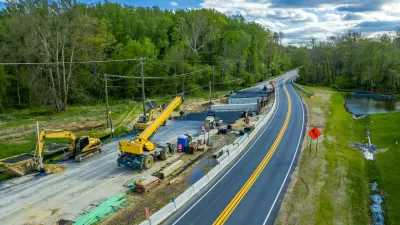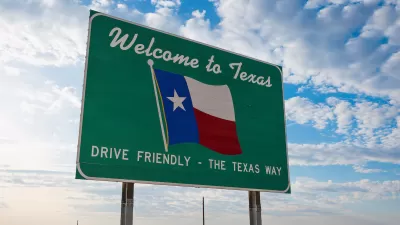A group of young climate activists are demanding an end to traffic-inducing road expansion projects and a renewed commitment to sustainable, transit-oriented transportation.

On the heels of a historic heat wave that devastated the Northwest, a group of Portland teenagers is protesting the Oregon DOT's plan to widen highways in the state, reports Laura Bliss. The protesters, who call their group Youth Vs. ODOT, are calling on the state to end freeway widening projects that contribute to increased congestion and carbon emissions.
Their demands might be having an effect, writes Bliss. "On Jan 18, the Federal Highway Administration rescinded a key approval of the controversial highway widening that’s been a prime target of the young protesters, the Rose Quarter Improvement Project along Portland’s Interstate 5," and requested a new environmental study.
As state transportation departments prepare to receive billions in federal funding, transportation advocates hope that sustainability will remain a top priority and that states will invest in public transit, bike lanes, and pedestrian infrastructure. But a slew of expansion projects planned around the country indicate these goals may not materialize.
The young Portland activists say by going forward with road projects, the city isn't living up to its progressive, bike-loving image. They call for increased investment in public transit, which would benefit more residents and help suburban dwellers reach the city more easily and efficiently. They want to see a change in the auto-oriented culture of Portland and, more broadly, the United States, which has enabled and subsidized car-dependent lifestyles. Even switching to electric vehicles, experts say, won't be enough to keep global warming from reaching catastrophic levels. Beyond stopping road expansion projects, Youth Vs. ODOT hopes to force even more drastic changes in how their state funds and prioritizes transportation projects.
FULL STORY: The Road Warriors

Planetizen Federal Action Tracker
A weekly monitor of how Trump’s orders and actions are impacting planners and planning in America.

Maui's Vacation Rental Debate Turns Ugly
Verbal attacks, misinformation campaigns and fistfights plague a high-stakes debate to convert thousands of vacation rentals into long-term housing.

Restaurant Patios Were a Pandemic Win — Why Were They so Hard to Keep?
Social distancing requirements and changes in travel patterns prompted cities to pilot new uses for street and sidewalk space. Then it got complicated.

In California Battle of Housing vs. Environment, Housing Just Won
A new state law significantly limits the power of CEQA, an environmental review law that served as a powerful tool for blocking new development.

Boulder Eliminates Parking Minimums Citywide
Officials estimate the cost of building a single underground parking space at up to $100,000.

Orange County, Florida Adopts Largest US “Sprawl Repair” Code
The ‘Orange Code’ seeks to rectify decades of sprawl-inducing, car-oriented development.
Urban Design for Planners 1: Software Tools
This six-course series explores essential urban design concepts using open source software and equips planners with the tools they need to participate fully in the urban design process.
Planning for Universal Design
Learn the tools for implementing Universal Design in planning regulations.
Heyer Gruel & Associates PA
JM Goldson LLC
Custer County Colorado
City of Camden Redevelopment Agency
City of Astoria
Transportation Research & Education Center (TREC) at Portland State University
Jefferson Parish Government
Camden Redevelopment Agency
City of Claremont





























